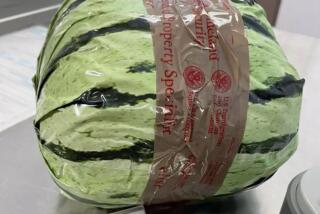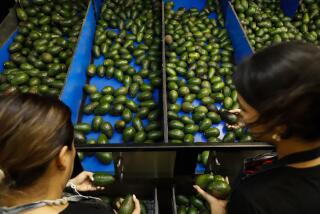Fishy Business : Shrimp Importer Claims Customs Ruined Shipment
- Share via
Pamela Cury was bringing a shipment--some of Latin America’s finest--from Guatemala into Los Angeles. “ Primo stuff,” she called it. “It was absolutely like gold.”
The cargo was shrimp, more than 29,000 pounds of top-grade, pond-raised jumbos, miniatures and all sizes in between, frozen in ice, loaded on a trailer rig and headed for a market near you.
But then, on Friday, the $157,000 load reached a U.S. Customs Service facility in South Gate. What happened there, according to Cury, was enough to make a seafood lover cry: Looking for drugs they never found, customs inspectors took hammers to the shrimp and smashed them to smithereens.
“They told me they were going to give it a complete drug examination,” Cury said. “They took hammers and were beating up the shrimp. They mutilated them . . . broke them into a million different pieces. I’ve never seen anything like this in my life.”
Cury said a team of customs inspectors broke open the 18-inch ice blocks and destroyed about 17,000 pounds of gourmet shrimp--worth more than $80,000 wholesale--in their search for contraband.
Customs spokesman John Miller disputed the amount of damage, saying that only about 10% of the truck’s seafood cases were opened. In an interview Saturday, he suggested that virtually all of the shrimp could be salvaged even from the broken ice blocks.
“I understand . . . no more than 10 pounds of the shrimp were irreparably damaged,” Miller said.
“That’s a lie,” Cury responded. “They pulled out half the cargo. It cannot be saved.”
Cury, 28, owner of Los Angeles-based Targa Fisheries Inc., said she was keeping the shattered cargo in a downtown cold-storage warehouse Saturday, hoping to break even on a shipment that once figured to net her $50,000. She charged that customs inspectors in South Gate appeared suspicious because of her age and resentful that she wanted to hurry the shipment through.
It was the first Latin American shipment being imported by her 3-year-old firm, she said.
“(The inspector) said, ‘You’re too young to be dealing in this kind of money,’ ” Cury said. “I said I didn’t do anything wrong.” When she tried to talk to a supervisor, Cury said, the inspector grew angry.
“He said, ‘I’ll teach you to go over my head. . . . I’m going to teach you a lesson. . . .’ ”
Miller said a customs supervisor responsible for the search denied that such comments were made.
Ralph Sellers, a Jackson, Miss., truck driver who was handling the shipment, said he was unable to hear conversations between Cury and the customs inspectors. But Sellers, contacted Saturday at a loading shed on his route north of Bakersfield, said several customs inspectors were laughing as eight of them broke into the shrimp crates.
Customs officials also denied that charge.
“They were laughing about it, like it was just a big damn mess,” Sellers, 50, said. “I said, ‘There’s nothing in there but pond-raised shrimp . . .’ and they run me off. I’ve been a driver for close to 35 years. I’ve hauled out of customs for a long, long time, and I’ve never had nothing like this.”
Miller said customs policy is to reimburse importers for improperly damaged goods if they can prove their case in a claim to the regional office in Los Angeles. But he said the case was not extraordinary--particularly since the shrimp made its way north by ship via Panama and New Orleans.
“Considering the routing of the shipment and the source country, it’s not unreasonable to expect a search of this kind,” Miller said. “She didn’t get any more or any less an examination than any other shipper would under the same circumstances.”
More to Read
Sign up for Essential California
The most important California stories and recommendations in your inbox every morning.
You may occasionally receive promotional content from the Los Angeles Times.













